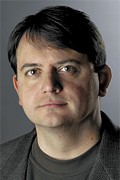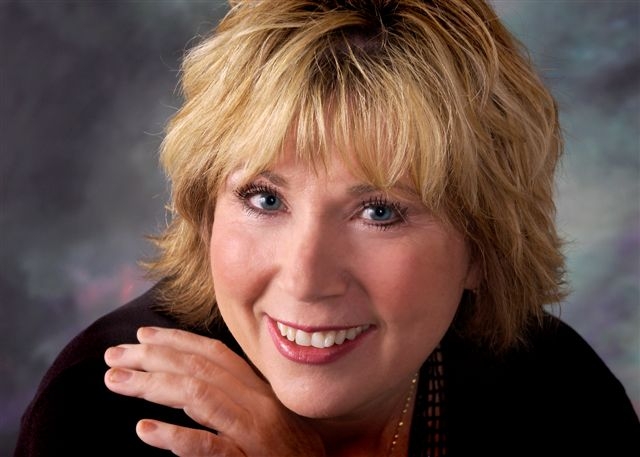
introducing readers to writers since 1995
August 11, 2005
More Talk About Conversion Rates
by Ron HoganAfter yesterday's post about Caitlin Kiernan's lamentation for missing bookbuyers, a couple of Beatrice readers with their own insider perspectives sent me their thoughts on the subject.
 Kevin Guilfoile, who did an Author2Author last month on his first novel, Cast of Shadows, observes, "The most basic element of an advertising media buy is the number of impressions, which are measured by Reach x Frequency. In the case of a radio ad, reach is how many people hear a commercial at any given time, and frequency is how many times they hear it. The problem is that a review in EW has wide reach but a frequency of one. It's the lack of a multiplier that makes a review by itself a poor sales tool."
Kevin Guilfoile, who did an Author2Author last month on his first novel, Cast of Shadows, observes, "The most basic element of an advertising media buy is the number of impressions, which are measured by Reach x Frequency. In the case of a radio ad, reach is how many people hear a commercial at any given time, and frequency is how many times they hear it. The problem is that a review in EW has wide reach but a frequency of one. It's the lack of a multiplier that makes a review by itself a poor sales tool."
"There are other ways to get frequency, however. As Richard Nash points out, if a book is widely reviewed, the reach will be expanded but many readers also will encounter more than one of them. And blurbs from good reviews will get new life in ads for the book and on the cover of the paperback. The second impression is more powerful than the first and the third more powerful than the second. The more someone hears the message, the more likely they are to buy the product...The particular situation Caitlin Kiernan describes is more analogous to direct mail. In direct mail, a decent response rate depends upon a lot of variables, but with the untargeted nature of a general interest mag like EW, the cost of a hardcover book, and a lack of incentive (e.g., "Mention Entertainment Weekly and get 20% off!") let's call it half of one percent. The problem is that while 1.7 million is the POTENTIAL number of people who could read her review, every person who has access to EW doesn't read every single article (and I'm assuming the 1.7 circulation number includes entire subscriber households and pass-along readers who might only look at the magazine for a few minutes). I have no statistics to back this up, but I'd bet that a very small percentage of potential EW readers reads any particular book review. If one percent of readers tackle that review, then a decent return might be one half of one percent of 17,000. Now we're talking 85 books."
Karen Spears Zacharias published Hero Mama, a memoir about being raised by a single mom after her father was killed in action in Vietnam, earlier this year (you've probably seen her on this site a couple times, if you've been around any length of time). Her take (and that of a book lover) after the jump!
 Karen reports that in addition to a Good Morning America segment, "because of the subject matter, and a lot of effort from the hardworking publicity team at William Morrow, the book garnered attention on NewsNight with Aaron Brown, the Diane Rehm and Bob Edwards shows, mentions in Newsweek and USA Weekend, and respectable reviews in various newspapers, including Military.Com, which serves all the military trade papers and claims to have an audience of 4 million." Not only that, "I was a weekly columnist for a paper with a circulation of 50,000. I had what I thought was a pretty faithful readership. Certainly, if nothing else, they would buy my book, right? Wrong."
Karen reports that in addition to a Good Morning America segment, "because of the subject matter, and a lot of effort from the hardworking publicity team at William Morrow, the book garnered attention on NewsNight with Aaron Brown, the Diane Rehm and Bob Edwards shows, mentions in Newsweek and USA Weekend, and respectable reviews in various newspapers, including Military.Com, which serves all the military trade papers and claims to have an audience of 4 million." Not only that, "I was a weekly columnist for a paper with a circulation of 50,000. I had what I thought was a pretty faithful readership. Certainly, if nothing else, they would buy my book, right? Wrong."
"While a respectable amount of readers did line up to buy my book at my first signing, they didn't number in the thousands, or even hundreds. Six months and sixty thousand miles of book tour latter (the bulk of travel expense came from my own pocket), sales figures weren't even high enough to warrant a second printing."What I learned is that we are a television culture in more ways than one. Not only do we spend more time watching tv than we do reading, the boob tube has morphed us into a herd-culture. We buy books in the same way we do shoes--by brand name. Quality counts, but only so much. What really matters is that we own the same brand that our neighbors do. Thus, a celebrity author like Jane Fonda can sell books in the millions while respectable authors who can really write and have something of true value to say have are forced into hawking their books door-to-door like Fuller Brushes."
And now for the reaction from the much coveted consumer: Mike B. says he doesn't buy any books he reads about in Entertainment Weekly: "I'm probably one of tens who subscribe and who has no interest in their take on books. For me, EW is emblematic of movies and television and celebrity--not literature...Actually, it's not that I don't pay attention to the reviews; what I usually do is skim, see what got an 'A' grade; see what got a 'C' or lower; and that usually does it for me." He also brings up another relevant angle on the complaint that launched this discussion:
"I'm tired of being held accountable by poor writers/actors/directors/producers for the failure of their product. If it isn't Stephen King telling me (in the pages of Entertainment Weekly) that it's my fault Kingdom Hospital didn't do well; or if it isn't the team behind the movies The Island and Stealth telling me that it's my fault for not liking their movies, or if it's the industry telling me that I'm to blame for how badly movies in general are doing--it's Kiernan telling me that her book should be doing better than it is. But it should only be doing better than it is if it's actually a good book."
Which, after checking Murder of Angels out of the local library, he doesn't believe to be the case. "She's better than a lot of the guys out there," Mike says, "But too much of her writing seems for show and not for telling... Also, I read about 50 pages and I have no idea what the plot is." (My pal Gwenda Bond takes issue with that assessment; she's been an unabashed Kiernan fan for some time now...)
your PayPal donation
can contribute towards its ongoing publication.